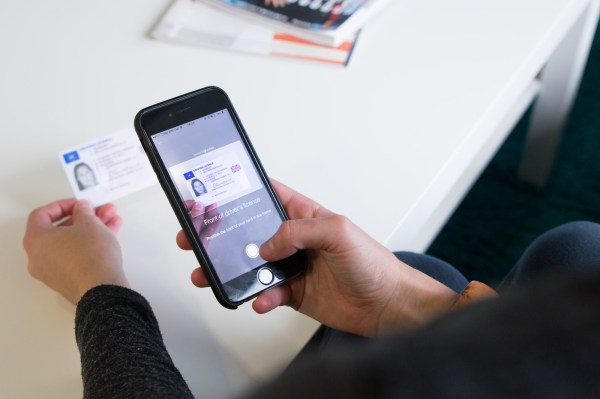Malicious hackers and security breaches that have exposed personal information of millions of people have pushed the issue of online security into the spotlight, not just for individuals but for organizations that do business with them. Now a company called Onfido, which has built a way to help websites verify people’s identities using a photo-based identity document, a selfie and artificial intelligence algorithms, has raised $30 million to seize the opportunity.
This brings the total raised by Onfido, which is based out of London, to around $60 million. This latest round was led by new investor Crane Venture Partners (whose co-founder Scott Sage had already been an advisor to Onfido), with participation alsoc from Microsoft Ventures in its first European investment, Salesforce Ventures and other unnamed but existing backers (it’s a long list).
 Husayn Kassai, Onfido’s CEO (pictured, right) who co-founded the company with Eamon Jubbawy (now COO) and Ruhul Amin (chief architect), said Onfido is not disclosing its valuation in this round.
Husayn Kassai, Onfido’s CEO (pictured, right) who co-founded the company with Eamon Jubbawy (now COO) and Ruhul Amin (chief architect), said Onfido is not disclosing its valuation in this round.
Onfido started life back in 2012 focusing on background checks, tapping into the surge of on-demand businesses that were rapidly scaling both their permanent staff and workforce of contractors — indeed that was the company’s bread and butter business when we covered their previous funding found in April 2016. It competed against the likes of Checkr in the U.S.
(And, it should be pointed out, among its customers was Uber, which had used Onfido in the past to run criminal background checks on drivers. Criminal checks have become one of the sticking points for the transportation giant in its current license dispute with London’s transport authority. More on that below.)
In the past year or so, Onfido has been gradually shifting its focus more to financial services and e-commerce, and specifically identity checks for businesses in these verticals. It currently has some 1,500 customers today including Square, Revolut and Zipcar.
As Kassai describes it, the challenge for banks, payment platforms and others is that they have a strong requirement to verify the identities of people with whom they do business (in part because of “Know Your Customer” regulations, but also because of the immense amount of fraud that has arisen in the last few years).
But on the other hand, running long or onerous checks when onboarding users — such as those from banks that require people to come into branches in person to prove they are who they say they are, or lengthy online verification techniques — often leads to a drop-off in interest.
“If you are a bank signing up new users, you expect a 40 percent drop-off rate because of the checks,” said Kassai. “Our solutions are geared at bringing that number down, especially in cases where a user might not have the right documents like utility bills, for example if they are new to a country.”
Onfido does this with an interesting solution that is based on standard identity documents — it recognises some 600 formats right now, from drivers’ licenses from dozens of countries, to passports, to identity cards and so on — and a “selfie” on your phone.
As it was demonstrated to me in their offices — in a conference room called “Abagnale” (each room is named after a famous identity forger) — this isn’t a photo as such, but in fact a live picture of you. You then respond to instructions for two or three different actions, such as a blink, a smile, saying a sequence of numbers or looking over your shoulder.
Onfido takes your responses to these commands to check that you’re not using a static photo, and to compare your face in the selfie to the picture on the ID card, while also running the ID card check at the same time. Its algorithms then provide a risk report for you, noting if you come up as completely compatible, mostly so, or to flag when it appears that you are not who the document says you are. All the data is then passed on to the company requesting the checks, both “compatible” checks and those that are flagged for further checks.
This last point is key in Onfido’s business model: as Kassai explained it to me, the company runs checks but doesn’t process any more beyond that, leaving the liability of acting or not acting on the results to the company requesting the checks. (In the current situation with Uber, I’m guessing that one route Uber may choose to take in its defense is to raise questions about how the data was accurate enough in its background checks.)
Onfido currently has a strong team of AI engineers on staff, specialists in machine learning and computer vision, who are regularly tinkering with the company’s algorithms to make them more sophisticated and of course to become smarter by way of all the images the platform is processing.
“From our point of view, in Europe, Onfido is one of the leading data enterprise companies at the moment, and they are spending a lot of money right now to continue investing into tech and product, with one of the best machine learning teams that we have come across,” said Sage at Crane, pointing out that his firm normally invests at seed stage but made an exception in this case because of the strength of the startup.
Kassai notes that they are continuing to recruit but also acknowledges that it’s a tough market, with its engineers getting “at least one call a week” from a recruiter. It’s a sticky point that’s even making it hard to figure out where the company should move to next.
Currently situated in an office above the Covent Garden Underground station, London Transport wants to kick them out soon to covert the space into residential property, and Kassai is mostly worried about finding a location where his staff won’t be as poachable, but at the same time continue being located in London.
Looking ahead, Onfido will continue to tap into the opportunity for solving ID verification in financial services. He says the startup’s revenues have grown five-fold in the last year but that he believes that 95 percent of the market is largely untapped when it comes to using newer technologies like Onfido’s. The company’s core focus is the U.K., U.S. and India and it plans to expand into Latin America, too. “There is huge fintech growth coming from Brazil and Mexico,” he said.
Beyond that, there are a number of other areas where the company hopes to apply its technology, and it’s talking to all the big names you might guess to help make it happen.
“We think the future for us is in new applications and new use cases rather than new features,” he said. “Look at voting, for making payments with your face. The main barrier in these has been really accurate facial recognition, but it won’t be in the future.”
